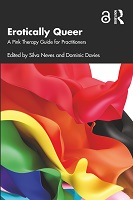Chapter 6 Intersex-centred sex therapy and relationship counselling
Proposal review
Six commonly neglected concerns of intersex adults
| dc.contributor.author | Ansara, Y Gavriel | |
| dc.date.accessioned | 2023-06-19T12:21:43Z | |
| dc.date.available | 2023-06-19T12:21:43Z | |
| dc.date.issued | 2023 | |
| dc.identifier.uri | https://library.oapen.org/handle/20.500.12657/63480 | |
| dc.description.abstract | In this chapter, Ansara discusses that psychotherapists’ engagement with intersex people has historically privileged the views of endosex (non-intersex) medical professionals and the needs and experiences of endosex parents with intersex children, often disregarding or invalidating the wishes of intersex people. Intersex people of all ages are often subjected to medical abuse, coercive practices, and gender policing, including some widespread procedures that cause permanent, irreversible harm. As partners, as parents, and in public life, adult intersex people continue to be targeted for dehumanisation, disenfranchisement, and oppression. Evidence shows that prioritising intersex people’s autonomy and human rights can improve intersex people’s psychosocial satisfaction and wellbeing. This chapter will introduce the reader to the diverse range of physiological variations, strengths, challenges, and experiences within the umbrella category of adult intersex people’s erotic, affectional, and relational lives. Ansara will critique popular myths, stereotypes, and tropes about intersex people, interrogating the epistemic violence perpetrated by racist, colonial, and ableist Eurocentric medical models and also by queer and feminist misappropriations of intersex people’s lived experiences into dehumanising and sensationalising political tropes. Ansara will introduce an intersex-centred framework for sex therapy and relationship counselling that integrates an anti-racist, decolonial praxis, and rights-based approach. This chapter will then provide intersex-centred practice guidelines and explore their real-life applications for centring adult intersex people’s own needs and experiences in psychotherapeutic practice, with a specific focus on sex therapy and relationship counselling contexts. | en_US |
| dc.language | English | en_US |
| dc.subject.classification | thema EDItEUR::J Society and Social Sciences::JM Psychology::JMU Psychology: sexual behaviour | en_US |
| dc.subject.classification | thema EDItEUR::J Society and Social Sciences::JM Psychology | en_US |
| dc.subject.classification | thema EDItEUR::M Medicine and Nursing::MK Medical specialties, branches of medicine::MKM Clinical psychology::MKMT Psychotherapy | en_US |
| dc.subject.other | psychotherapists, intersex, endosex, medical abuse, gender policing, sex therapy, relationship counselling | en_US |
| dc.title | Chapter 6 Intersex-centred sex therapy and relationship counselling | en_US |
| dc.title.alternative | Six commonly neglected concerns of intersex adults | en_US |
| dc.type | chapter | |
| oapen.identifier.doi | 10.4324/9781003260608-7 | en_US |
| oapen.relation.isPublishedBy | 7b3c7b10-5b1e-40b3-860e-c6dd5197f0bb | en_US |
| oapen.relation.isPartOfBook | b1172113-5019-47ce-9b4f-a7a985c17cc6 | en_US |
| oapen.relation.isbn | 9781032197326 | en_US |
| oapen.relation.isbn | 9781032197319 | en_US |
| oapen.imprint | Routledge | en_US |
| oapen.pages | 20 | en_US |
| peerreview.anonymity | Single-anonymised | |
| peerreview.id | bc80075c-96cc-4740-a9f3-a234bc2598f1 | |
| peerreview.open.review | No | |
| peerreview.publish.responsibility | Publisher | |
| peerreview.review.stage | Pre-publication | |
| peerreview.review.type | Proposal | |
| peerreview.reviewer.type | Internal editor | |
| peerreview.reviewer.type | External peer reviewer | |
| peerreview.title | Proposal review | |
| oapen.review.comments | Taylor & Francis open access titles are reviewed as a minimum at proposal stage by at least two external peer reviewers and an internal editor (additional reviews may be sought and additional content reviewed as required). |

